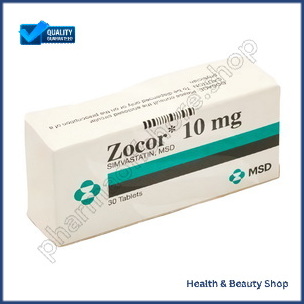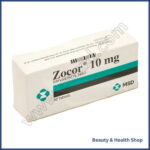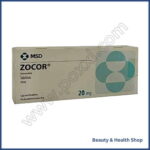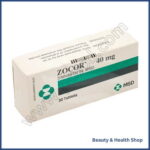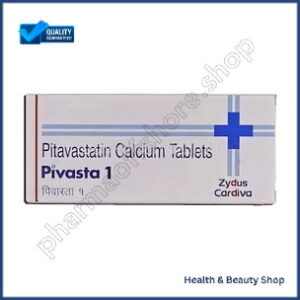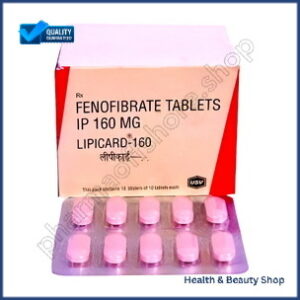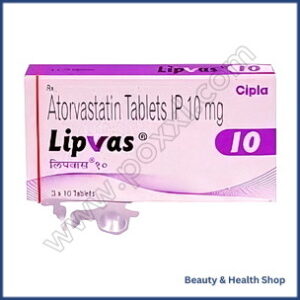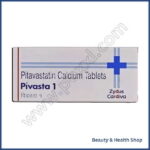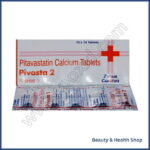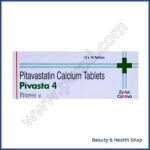ADDICTION
ALCOHOL DEPENDENCE
QUIT SMOKING
ALLERGY
ANTI FUNGAL
FUNGAL INFECTION
FUNGAL NAIL INFECTIONS
ANTI-REJECTION DRUGS
ANTI WORM
ANTIBIOTIC
BACTERIAL INFECTIONS
ARTHRITIS
GOUT
OSTEOARTHRITIS
RHEUMATOID ARTHRITIS
BLOOD
LOW PLATELET COUNT
THROMBOPHLEBITIS
VARICOSE VEINS
COLON
ANAL FISSURE
PILES
ULCERATIVE COLITIS
DIABETES CARE
DIABETES INSIPIDUS
DIABETES TYPE
DIABETIC FOOT ULCERS
GLUCOSE MONITOR
EYES/EAR CARE
DRY EYES
EYE CARE
EYE EXAMINATION
EYE INFECTION
EYE LASHES
EYE PAIN
GLAUCOMA
OCULAR HYPERTENSION
UVEITIS
FEVER CARE
MALARIA
RHEUMATIC FEVER
TYPHOID FEVER
GASTROINTESTINAL
ACIDITY
CONSTIPATION
CROHN'S DISEASE
DIARRHOEA
GALLBLADDER STONES
INTESTINAL ULCERS
IRRITABLE BOWEL SYNDROME
MOTION SICKNESS
NAUSEA
Zocor (Simvastatin)
Zocor 10 mg (Simvastatin)
Zocor 20 mg (Simvastatin)
Zocor 40 mg (Simvastatin)
| Active Ingredient (Generic Name): | Simvastatin |
|---|---|
| Indication: | High cholesterol |
| Manufacturer | MSD Pharmaceuticals India Pvt. Ltd. |
| Packaging: | 10 tablets in one strip |
From: $78.00
You are prescribed Zocor (simvastatin), a statin medication that helps lower cholesterol levels and reduce the risk of heart disease and stroke. Zocor comes in oral tablet form with strengths ranging from 5 mg to 40 mg. It works by inhibiting HMG-CoA reductase, which decreases LDL cholesterol levels and increases LDL receptors for cholesterol removal. Following the prescribed dosage will help lower your risk of serious health conditions and cardiovascular disease. Learn more about potential side effects, dosing, and special considerations for optimal treatment.
Main Points
Zocor (Simvastatin) is a statin drug prescribed to lower cholesterol levels and reduce the risk of heart disease and stroke. It works by inhibiting HMG-CoA reductase, which decreases LDL cholesterol levels and boosts LDL receptors for cholesterol elimination. Common side effects may include headache, muscle pain, and nausea, while less frequent side effects could involve muscle and joint pain, as well as elevated liver enzymes. The recommended dosage is 10-20 mg orally once daily in the evening, with a maximum daily dose of 40 mg. Consistent timing of administration is essential for optimal effectiveness. Zocor is not recommended during pregnancy or breastfeeding, and patients should seek medical advice if pregnant, planning pregnancy, or breastfeeding.
What Is Zocor (Simvastatin)?
Zocor, also referred to as simvastatin, is a type of statin medication used to lower cholesterol levels. It is commonly prescribed to reduce the risk of heart disease and stroke. This medication is taken orally in tablet form, with strengths ranging from 5 mg to 40 mg. Typically, Zocor is taken once daily in the evening, with or without food, following your doctor’s instructions consistently for optimal results.
As a statin, Zocor works to decrease low-density lipoprotein (LDL) cholesterol, often referred to as ‘bad’ cholesterol. Elevated LDL cholesterol is a key risk factor for cardiovascular diseases like heart attacks and strokes. By lowering LDL cholesterol levels, Zocor helps reduce the risk of these serious conditions. Your doctor may have prescribed Zocor as a standalone treatment or in combination with other medications to manage cholesterol levels and lower your cardiovascular risk.
How Does Zocor Work?
Zocor inhibits HMG-CoA reductase, an enzyme crucial for cholesterol synthesis in the liver. By blocking this enzyme, Zocor reduces LDL cholesterol levels, decreasing the risk of cardiovascular diseases. This action prompts the liver to increase LDL receptors, aiding in the removal of excess cholesterol from the bloodstream and slowing the progression of atherosclerosis.
Zocor Uses and Benefits
Zocor is primarily prescribed to lower cholesterol levels in the blood, reducing the risk of heart disease and preventing cardiovascular events like heart attacks and strokes. Following the prescribed dosage of Zocor can effectively manage cholesterol levels and decrease the likelihood of these serious health conditions.
Reduces Cholesterol Levels
Simvastatin inhibits cholesterol production in the liver, reducing total and LDL cholesterol levels in the bloodstream. This decrease in ‘bad’ cholesterol helps prevent plaque buildup in the arteries, lowering the risk of cardiovascular events like heart attacks and strokes. Simvastatin also raises HDL cholesterol, or ‘good’ cholesterol, which aids in removing excess cholesterol from the bloodstream. By balancing LDL and HDL levels, simvastatin effectively manages cholesterol levels and reduces the risk of cardiovascular disease.
Lowers Heart Risk
Simvastatin reduces the risk of cardiovascular disease by lowering total and LDL cholesterol levels. This helps to prevent the buildup of plaque in the arteries, reducing the likelihood of heart attacks, strokes, and other cardiac events. Simvastatin decreases high total cholesterol by 25-30%, high LDL cholesterol by 35-40%, high triglycerides by 10-15%, and increases low HDL cholesterol by 5-10%.
Prevents Cardio Events
Taking Zocor as prescribed can significantly lower your risk of cardiovascular events like heart attacks, strokes, and revascularizations. Studies consistently show that Zocor effectively reduces the occurrence of cardiovascular events in individuals with high cholesterol levels. By following the recommended dosage, Zocor helps decrease LDL (bad) cholesterol levels, a key factor in cardiovascular disease. This reduction in cholesterol levels can lower the chances of experiencing heart-related issues. Moreover, Zocor has been proven to slow down the progression of atherosclerosis, a condition marked by artery plaque buildup. By preventing cardiovascular events, Zocor contributes to better overall health and well-being. Incorporating Zocor into your treatment regimen is a proactive approach to minimizing your cardiovascular risk and enhancing your long-term health.
Common Side Effects of Zocor
Common side effects of Zocor, affecting around 10% of patients, include headache, muscle pain, and nausea. These symptoms may occur initially but typically diminish with time. It’s important to note that these side effects are generally mild and transient. Over-the-counter pain relievers like acetaminophen or ibuprofen can help alleviate headaches, while stretching exercises or warm baths can ease muscle pain.
In addition, dizziness, diarrhea, or stomach upset may also occur, but these are typically mild and can be managed with lifestyle adjustments. Taking Zocor with food can reduce the risk of stomach upset, and moving slowly from sitting or lying positions can minimize dizziness. If you experience severe or persistent side effects, consult your doctor for guidance on symptom management or potential dosage adjustments.
Less Common Side Effects
As you learn more about Zocor’s side effects, you may encounter less common issues like muscle and joint pain that can impact daily activities. It’s important to be mindful of potential liver enzyme elevation, which requires close monitoring by your doctor.
Muscle and Joint Pain
Muscle and joint pain can occur while taking Zocor (simvastatin), impacting daily activities. Symptoms include stiffness, aching, or soreness in muscles and joints, ranging from mild to severe. Muscle weakness or cramping may also be present. Notify your doctor of any discomfort to adjust dosage or explore alternative treatments. Higher Zocor doses or a history of muscle issues increase the likelihood of experiencing this side effect. Certain medications like fibrates or niacin can raise the risk of muscle pain when combined with Zocor. Monitoring muscle enzyme levels through blood tests is advised to prevent muscle damage. Persistent or severe muscle and joint pain may prompt a switch to different cholesterol-lowering medications or an adjusted treatment plan.
Liver Enzyme Elevation
Elevated liver enzymes may occur in around 1-2% of individuals taking Zocor. This elevation can suggest liver damage or inflammation, but is often mild and reversible. Regular monitoring by your healthcare provider is crucial to ensure your liver function remains stable.
Key points to note:
- Mild elevations are usually symptomless and may not require treatment.
- Moderate elevations might lead to a temporary Zocor dose adjustment or discontinuation.
- Severe elevations may necessitate stopping Zocor permanently and closely monitoring liver function.
- Regular monitoring is essential to detect any enzyme elevations early for prompt intervention.
Discuss any concerns with your healthcare provider, especially if you have a pre-existing liver condition. Being mindful of potential liver enzyme elevation can help safeguard your liver health while using Zocor.
Who Should Not Take Zocor?
Zocor should be avoided if you have active liver disease or unexplained elevated liver enzymes, as it may exacerbate these conditions. It is also not recommended for use during pregnancy or while breastfeeding due to uncertain effects on the fetus or baby. Certain medical conditions, such as liver disease, may contraindicate the use of Zocor, necessitating alternative treatments or close monitoring of liver function. Prior to starting Zocor therapy, it is important to discuss any medical history or concerns with your healthcare provider.
Zocor Interactions With Other Meds
Before prescribing Zocor, your doctor should carefully assess your current medications to avoid potential interactions. Zocor may interact with certain drugs, such as antibiotics, antifungals, blood thinners, and HIV medications, which could increase the risk of muscle damage. It is crucial to disclose all medications you are taking, including prescription and over-the-counter drugs, as well as vitamins and supplements. Some medications that may interact with Zocor include erythromycin, clarithromycin, telithromycin, itraconazole, ketoconazole, warfarin, ritonavir, and lopinavir. These interactions can affect how Zocor functions and may raise the risk of adverse effects.
Proper Dosage and Administration
For optimal cholesterol-lowering benefits with minimal risk of side effects, adherence to the prescribed dosage and administration guidelines for Zocor is essential. Zocor should be taken orally, once daily in the evening, with or without food. The typical initial dose ranges from 10-20 mg, which may be adjusted by your doctor as needed. The maximum recommended daily dose is 40 mg.
Swallow the tablet or capsule whole, without crushing or breaking it. If you are using other cholesterol-lowering medications, your doctor may recommend a different dosing schedule. Consistency in taking Zocor at the same time each day is crucial for its effectiveness. Do not alter your dosage or discontinue Zocor without consulting your healthcare provider, as this could impact cholesterol management. In case of a missed dose, take it as soon as you remember, but do not double up on doses. Adhering to the prescribed dosage and administration routine is key to maximizing the benefits of Zocor therapy.
Zocor and Pregnancy or Breastfeeding
Pregnant women or those planning pregnancy should use caution with Zocor due to potential risks to fetal development. Simvastatin’s effects on fetuses are not fully understood, so weighing the benefits against risks is crucial. Zocor is a Category X medication, contraindicated during pregnancy. Breastfeeding while taking Zocor is not recommended as it may harm nursing infants. Discuss with your doctor about alternative therapies or lifestyle changes for managing cholesterol if pregnant or breastfeeding. Consult your doctor before taking Zocor if pregnant, planning pregnancy, or breastfeeding for informed decision-making.
Overdose Symptoms and Treatment
If you suspect an overdose of Zocor, watch for symptoms like nausea, vomiting, and diarrhea. These signs can worsen without intervention. Seek immediate medical help if you experience any of these symptoms, as prompt treatment is crucial for recovery.
Recognizing Overdose Symptoms
Simvastatin overdose symptoms can vary in severity and may include gastrointestinal, neurological, and musculoskeletal effects. It’s important to recognize these symptoms promptly to seek medical attention and prevent complications.
Symptoms of simvastatin overdose may include nausea, vomiting, diarrhea, abdominal pain, headache, dizziness, confusion, lethargy, muscle weakness, muscle cramps, joint pain, fatigue, anorexia, and increased liver enzymes. If you suspect an overdose, seek immediate medical attention for assessment and proper treatment.
Emergency Treatment Options
In cases of simvastatin overdose, immediate medical attention is crucial to minimize the risk of complications and potential fatality. If an overdose is suspected, contact emergency services or the poison control center promptly. Refrain from inducing vomiting or offering fluids unless advised by medical professionals.
Upon hospital arrival, healthcare providers will evaluate the situation and deliver supportive care to address symptoms. Treatment may include administering activated charcoal to absorb the excess drug and using a laxative to facilitate its elimination. In severe instances, hemodialysis might be necessary to extract the drug from the bloodstream.
Symptom-specific medication may be provided to alleviate issues like muscle pain or liver abnormalities. Continuous monitoring of liver function and lipid levels will be essential in the post-overdose period. Collaborate with your healthcare team to devise a personalized recovery plan that ensures a safe and successful recuperation.
Generic and Brand Name Options
Simvastatin, found in Zocor, is available in brand-name and generic forms, providing options for managing high cholesterol. Understanding the differences between these choices is important.
- Brand-name Zocor: The original medication by Merck & Co., offering the same effectiveness and safety as generic options.
- Generic simvastatin: An affordable alternative to Zocor with the same active ingredient and effects.
- Authorized generic simvastatin: A generic Zocor version made by Merck & Co. under a different label, often at a lower price.
- Other generic simvastatin products: Generic versions of Zocor by different manufacturers, varying in cost and availability.
Consult your healthcare provider to determine the best option based on your needs and budget.
Frequently Asked Questions
Can I Stop Taking Zocor if I Feel Better?
Before discontinuing Zocor because you feel better, it is crucial to consult your healthcare provider. Do not assume it is safe to stop taking your medication simply because your symptoms have improved. Your doctor can assess whether it is appropriate to stop or adjust your treatment plan. Abruptly stopping Zocor can have adverse effects, so seek professional guidance before making any changes to your medication routine.
Will Zocor Affect My Ability to Drive Safely?
When assessing the impact of any medication on your daily activities like driving, it’s essential to consider potential side effects. While most medications typically don’t directly affect driving ability, some may lead to drowsiness, dizziness, or blurred vision, which could impair your skills behind the wheel. Fortunately, if you’re taking Zocor, it’s unlikely to significantly affect your driving capabilities. Zocor’s mild side effects usually do not affect cognitive function or motor skills, reducing the risk of impairment while driving.
Can I Take Zocor With Grapefruit or Grapefruit Juice?
Consuming grapefruit or grapefruit juice while taking Zocor can be risky. Grapefruit contains compounds that may interact with certain medications, potentially increasing their effectiveness. It is important to be cautious and avoid grapefruit products when using Zocor, as they can elevate the levels of simvastatin in your body, raising the risk of experiencing adverse effects. For personalized advice on this matter, consult your doctor or pharmacist to ensure your safety.
How Long Does It Take to See Results From Taking Zocor?
Results from taking cholesterol-lowering medication such as Zocor typically become noticeable within 4-6 weeks, showing a significant decrease in LDL (bad) cholesterol levels. It’s important to note that individual responses may vary. Monitoring your progress through regular blood tests is crucial. By adhering to your treatment regimen, you can work towards achieving improved cholesterol levels.
Can Zocor Be Used to Treat High Triglycerides?
Yes, certain statins can help reduce high triglycerides. While primarily designed to lower LDL cholesterol, Zocor may also have a secondary benefit of slightly reducing triglyceride levels.
Conclusion
You have received information about Zocor, a medication designed to lower cholesterol levels and reduce the risk of heart disease. Understanding its mechanism of action, benefits, and potential side effects will help you make informed decisions about your treatment. Remember to adhere to the prescribed dosage and administration instructions, and consult your doctor if you have any concerns or questions.


